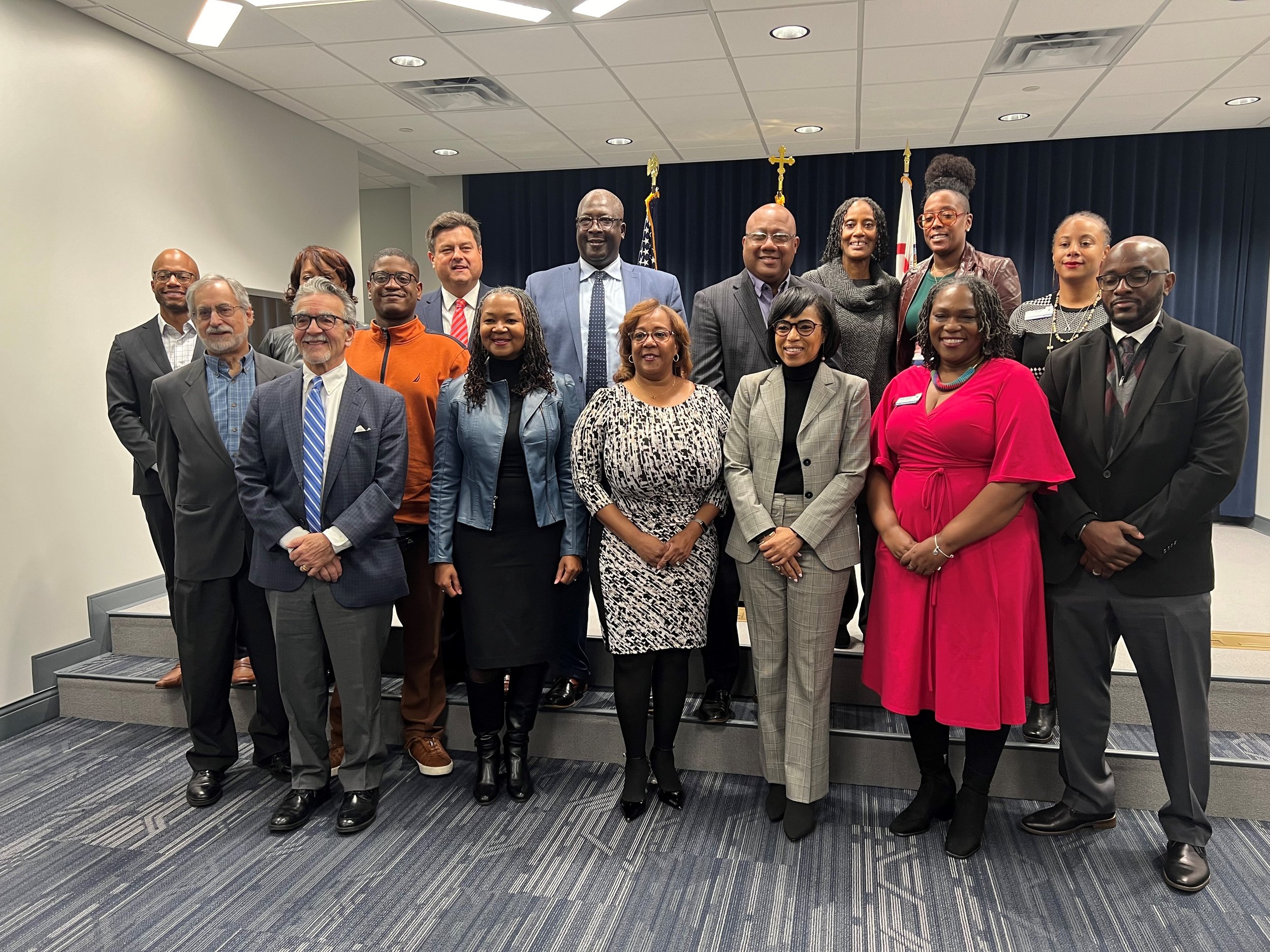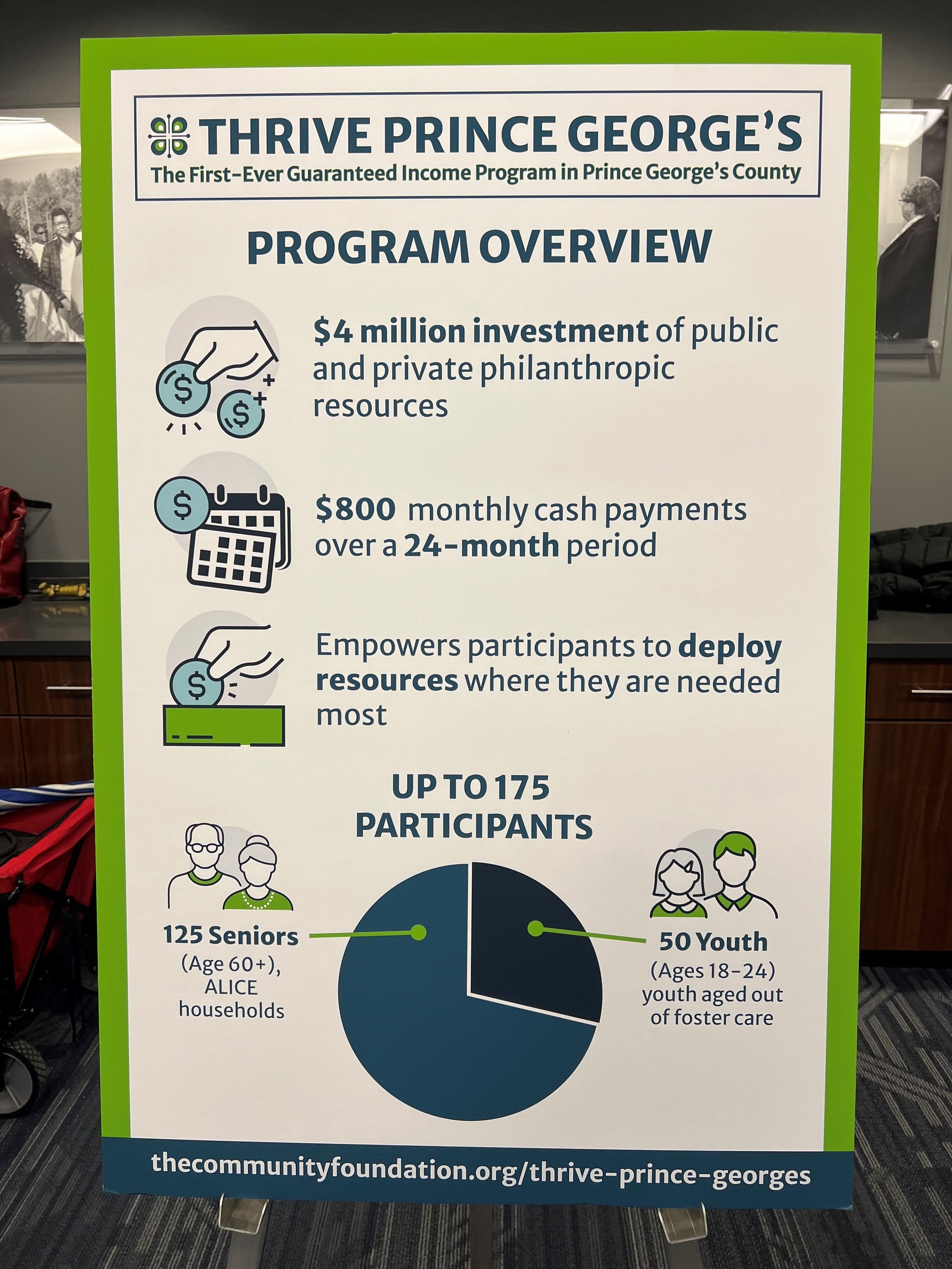The pilot will provide $800 per month for 24 months to seniors and youth who have aged out of the foster care system.
The public-private partnership behind Thrive Prince George’s, the county’s first-ever guaranteed income pilot program, are pleased to announce that cash distributions will begin this month as part of a two-year, $4 million pilot that seeks to provide greater economic stability and mobility for families in the region. The program will provide monthly cash payments of $800 to 50 youth (age 18-24) who have aged out of foster care and 125 seniors (age 60+) for a 24-month period with no strings attached.
“Studies have shown that modest guaranteed basic income pilots can decrease poverty by as much as 40%,” said Tonia Wellons, President and CEO of the Greater Washington Community Foundation. “We strongly believe that this program will improve the lives of many in Prince George’s County and will reduce the racial wealth gap in a way that makes it viable for the county to consider providing guaranteed basic income for years to come.”
The pilot program application period opened on December 11, 2023, and received over 5,000 inquiries for 175 slots before closing in mid-January 2024. The partners determined eligibility requirements to ensure that limited resources would be directed towards participants residing in high poverty zip codes (according to ACS and Census), representing ALICE households (earning above the Federal Poverty Level but less than the basic cost of living), with preference given to caregivers and returning citizens.
Thrive Prince George’s is funded through a public-private partnership leveraging both public and private philanthropic resources from the Greater Washington Community Foundation, Prince George’s County Executive and County Council, and the Meyer Foundation.
"This initiative is an innovative example of how we find solutions through public-private partnerships," said Prince George’s County Executive Angela Alsobrooks. "Thanks to this collaborative pilot program, we're weaving a stronger social fabric and helping people improve their quality of life."
While several pilots are currently operating around the region – including in Arlington, Alexandria, Fairfax, DC, and Montgomery County – and the country, this is the first guaranteed income program to exclusively serve residents of Prince George’s County.
“I’ve championed the guaranteed basic income program for years because I know it provides an opportunity to tackle poverty and create better quality of life for our residents,” said County Council Member Krystal Oriadha. “My hope is with more jurisdictions moving to implement programs like this, we will see an investment at the state and federal level that will allow these pilots to become permanent. I am excited about partnering with organizations like the Greater Washington Community Foundation to make this dream a reality.”
Guaranteed income programs have proven to be one of the most promising approaches to increasing financial stability. The positive impact of guaranteed income has been studied for decades, with evidence indicating that monthly cash payments can reduce income volatility and support recipients in attaining full-time employment, greater housing stability, improved health outcomes, and more.
“The Meyer Foundation is glad to partner in the growing local movement for economic justice by investing in efforts that honor the humanity and self-determination of individuals in our region,” said Meyer Foundation President and CEO George L. Askew, MD. “The positive impacts of guaranteed basic income programs like Thrive Prince George’s County have been well researched and ultimately create greater momentum toward the policy and systems change we hope to see throughout Greater Washington and beyond.”
The Community Foundation will administer the pilot program as part of its Together, We Prosper Campaign for Economic Justice, which is focused on investing in economic strategies that will increase economic mobility to help close the region’s racial wealth gap.
It has also partnered with Court Appointed Special Advocate Prince George’s County (CASA) and United Communities Against Poverty (UCAP), two community-based organizations in Prince George’s County that led the recruitment, selection, and onboarding of participants, and are distributing the cash payments.
"One's quality of life should not decline due to the privilege of age. The ability to thrive should also not be contingent upon one's socioeconomic status in their community. UCAP is privileged to have the opportunity to take a role in a pilot program that will immediately and positively impact the life of the participant...THRIVE Prince George's,” said Rasheeda Jamison-Harriott, President & CEO, United Communities Against Poverty, Inc. (UCAP).
“Youth who have experienced foster care are more likely to experience hardships such as unemployment, health issues, increased rates of incarceration, and many become unhoused. Thrive Prince George's allows Court Appointed Special Advocates/CASA to help disrupt cycles of generational poverty, create a continuum of care, and increase the likelihood of long-term stability for young people as they adjust to independence. These are our emerging adults. We want them to know that we see them, and we are honored for the opportunity to stand with an ecosystem of organizations committed to their long-term success,” said Yolanda Johnson, Executive Director, Court Appointed Special Advocates (CASA), Prince George's County.
Other program partners include Prince George’s County Department of Social Services; Prince George’s ChangeMakers, an advocate for the adoption of a guaranteed income program in Prince George’s County; and Capital Area Asset Builders, which will offer technical assistance based on its experience operating several similar programs.
The Community Foundation has also partnered with Urban Institute to measure how the economic status of participants improves over time and implement an evaluation program that balances quantitative and qualitative measures that have historically demonstrated client progress and program viability.
For more information about Thrive Prince George’s, visit www.thecommunityfoundation.org/thrive-prince-georges.


